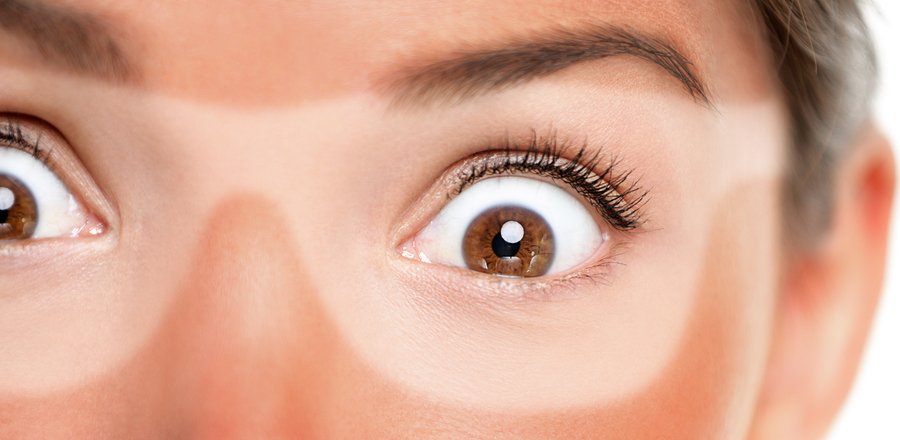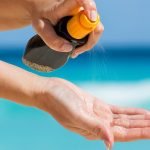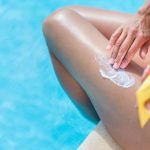Now that summer is almost upon us, and in many places it is already warm enough to switch to short-sleeved shirts and spend more time outdoors, we need to consider how to best protect our skin. There are multiple factors that go into this decision, but for those of us who use sunblock when outside for a lengthier time, new research suggests that we might benefit from trying a much higher SPF than the one we are currently using.
The study, which was conducted at New York University in New York, New York, found that SPF 100 sunscreens may be considerably more effective than those with an SPF 50 rating.1 Williams, Joshua D.; et al. “SPF 100+ sunscreen is more protective against sunburn than SPF 50+ in actual use: Results of a randomized, double-blind, split-face, natural sunlight exposure clinical trial.” Journal of the American Academy of Dermatology. May 2018. Accessed 30 April 2018. http://www.sciencedirect.com/science/article/pii/S0190962217329080. These results were based on an experiment that involved 199 American men and women.
Each of the subjects was provided with two tubes of sunscreen. One of these was marked left, and the other was marked right, indicating which side of their face and neck the product was intended for. After applying the sunscreen, the participants spent the better part of the sunny day outside at a ski resort in Vail, Colorado. Skiing, snowboarding, and the like can actually be quite damaging to the skin, as the sun’s rays reflected off the snow and the higher altitude make a dangerous combination for any exposed skin.
One of the bottles given to the volunteers contained an SPF 50 sunblock and the other contained an SPF 100 sunblock, to provide a direct comparison in the exact same conditions. The following day, a dermatologist evaluated each subject’s face and used a five-point scale ranging from none to severe to rate the severity of the sunburn. The average rating was more than twice as high on the SPF 50 side of the face as it was on the SPF 100 side.
This is interesting because the Food and Drug Administration has stated that an SPF above 50 confers no extra protection from the sun and is unnecessary. This might be true when sunscreens are lab tested, but in reality, most of us do not apply enough of the lotion or apply it evenly. And reapplying is another problem, with many people waiting too long or failing to reapply after swimming or sweating, causing the sunscreen to lose effectiveness.
We do need to take into consideration the fact that this study, while carried out by researchers at a major university, was paid for by Johnson & Johnson, a manufacturer of sunscreen products under the brands Neutrogena and Aveeno. It is obviously in their best interest financially to promote the value of a wide range of sunscreens.
That brings us to another important point, which is that plenty of people do not want to use sunscreen at all. Many of us share the viewpoint that slathering large portions of our skin with chemicals is unsafe and there is little to no evidence that sunscreen actually prevents skin cancer. If you’re in that camp, there are plenty of ways to stay smart in the sun without giving up time outdoors. Avoid sun exposure in the middle of the day when the rays are most powerful. And try to find shady spots that will keep you out of the direct sun as much as possible.
Lightweight, long-sleeved shirts and pants can keep much of your body protected. Hats with a wide brim all around will do double duty covering your face and the back of your neck (a high collar or turtleneck can help here too), and a baseball cap will do when it’s just your face you’re looking to shade. Antioxidants are also beneficial in undoing damage from the inside out, so consider increasing your intake of foods rich in carotenoids and taking a natural antioxidant supplement.
And let’s not forget that whether you choose to use sunscreen or other forms of sun-blocking protection, you do need to give yourself some controlled sun exposure every day. Our bodies produce vitamin D in reaction to sunlight, and that won’t happen if you prevent any sun from reaching your skin. Most people can spend up to 20 unprotected minutes in the sun safely without starting to burn. So, make sure you get this dose of sunlight at some point each day, and/or supplement with 1,000 to 2,000 IU of vitamin D3 to ensure that your intake is always adequate.
References
| ↑1 | Williams, Joshua D.; et al. “SPF 100+ sunscreen is more protective against sunburn than SPF 50+ in actual use: Results of a randomized, double-blind, split-face, natural sunlight exposure clinical trial.” Journal of the American Academy of Dermatology. May 2018. Accessed 30 April 2018. http://www.sciencedirect.com/science/article/pii/S0190962217329080. |
|---|










